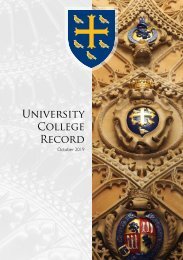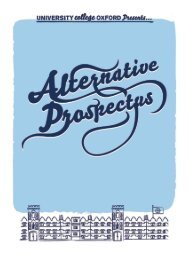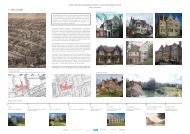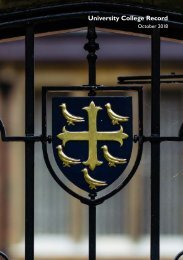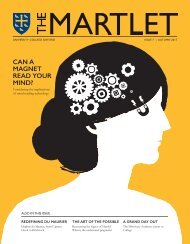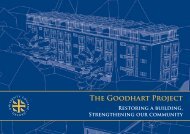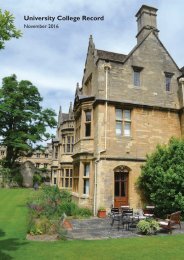You also want an ePaper? Increase the reach of your titles
YUMPU automatically turns print PDFs into web optimized ePapers that Google loves.
Emeritus Fellows<br />
GLEN DUDBRIDGE, Shaw Professor<br />
of Chinese and Fellow of <strong>Univ</strong>ersity<br />
College from 1989-2005, died on 5<br />
February <strong>2017</strong> aged 79. Glen had been<br />
educated at Bristol Grammar School<br />
before going up to Magdalene College<br />
Cambridge, where he remained as both<br />
an undergraduate and a postgraduate.<br />
In 1965 Glen moved to Oxford to<br />
become a Lecturer in Modern Chinese<br />
and in 1966 he was also appointed a<br />
Governing Body Fellow of Wolfson<br />
College. He was elected a Fellow of<br />
the British Academy in 1984. In 1985,<br />
however, he returned to Cambridge<br />
and a Fellowship at Magdalene College<br />
when he was appointed Professor of<br />
Chinese there. In 1989 Oxford won out<br />
once more, when Glen was elected to<br />
the Chinese chair here, and with it to a Fellowship at <strong>Univ</strong>, where he remained until his<br />
retirement in 2005. Glen also held visiting Professorships at Yale and the <strong>Univ</strong>ersity of<br />
California, Berkeley, and was elected an Honorary Member of the Chinese Academy of<br />
Social Sciences in 1996. After 2005, Glen became an Emeritus Fellow of <strong>Univ</strong> (he had<br />
already been an Emeritus Fellow of Wolfson since 1985), and continued to be a regular<br />
and welcome presence in College until his last illness.<br />
Glen’s major publications include The Hsi-yu chi (1970); The Legend of Miao-shan<br />
(1978; 2nd edition 2004; Chinese edition, 1990); The Tale of Li Wa (1983); Religious<br />
experience and lay society in T’ang China (1995); Lost Books of Medieval China (2000);<br />
Books, Tales and Vernacular Culture (2005); and A Portrait of Five Dynasties China (2013).<br />
More recently he had become an important member of a group engaged in translating a<br />
major Tang dynasty historical source.<br />
Glen’s former colleague, Dr. Tao Tao Liu, Emeritus Fellow of Wadham College, has<br />
kindly provided this tribute:<br />
“Glen led the Institute of Chinese Studies as its Director to our site in Walton Street<br />
in the old Clarendon Press Institute, leaving the Oriental Institute where we had been<br />
since the founding of the faculty, and to which we were still attached for all faculty<br />
matters; indeed Glen had always played his part in faculty affairs and had been the<br />
Chairman of the Faculty Board.<br />
“Glen was very keen on making Walton Street the centre for Chinese Studies in all<br />
aspects of life. He felt very loyal to the staff at the new Institute of Chinese, and our<br />
offices were grouped round the Director’s in such a way that we ran into each other every<br />
day so there was a strong sense of community. He loved having long conversations with<br />
all of us – as he said, he was ‘a bit of a gasbag’!<br />
52<br />
“Glen was very conscientious and hard working. He put the institution he worked<br />
in as well as his own work on the same high level. He was very interested in all aspects<br />
of Chinese studies, putting much effort for instance into students’ progress in learning<br />
the modern Chinese language. He insisted on the highest standards from his students,<br />
and strove hard to find it in them as well as in himself. One student remembers ‘the<br />
contortionist crossings of his long legs he used to manage in class’ which shows his<br />
attention to their utterances and his determination that they should produce their best.<br />
“His own spoken Chinese was excellent. His children still noticed that their parents<br />
communicated in Chinese. His wife Sylvia who is Chinese by birth gave him every<br />
support. According to his colleagues who were once students with him at Cambridge,<br />
Glen was very good at the language side of things especially in Classical Chinese from<br />
the beginning. Glen himself started his research in Chinese fiction, beginning with<br />
Journey to the West which had been composed in the vernacular. He diversified into all<br />
sorts of narrative, some in classical Chinese, from the Tang dynasty onwards, using<br />
material that showed the development of fiction in his many publications.<br />
“He loved music, and one of his ‘treats’ for himself was to buy a baby grand piano for<br />
his retirement. We used to be quite surprised to find our professor playing in a band (in<br />
place of his son) on the street in Oxford at the weekend.”<br />
Glen’s successor but one, our current Shaw Professor of Chinese, Barend ter Haar,<br />
adds:<br />
“For many decades since my doctoral studies, ‘Professor Dudbridge’ was mostly a<br />
much respected, somewhat intimidating presence in distant England. I worked in Leiden<br />
and Heidelberg, where I did meet him from time to time at conferences. As these things<br />
go in scholarly life one gets to know a person mostly through his articles and books,<br />
which were always a great joy to read and most of all to use in class and in doing research.<br />
When I came to Oxford in January 2013, it was as his indirect successor and I have<br />
always considered it a great honour. He and Sylvia were very helpful in preparing our<br />
way into Oxford, making us feel really welcome. More importantly, I now got to know<br />
him quite well on a more personal level, since we both frequented the Chinese studies<br />
coffee mornings with great regularity. From ‘Professor Dudbridge’ he now became Glen.<br />
He sometimes mused on my very ‘different’ way of presenting information and I suspect<br />
that had I been his student he would have tried to root my sloppiness out. Luckily, we<br />
could maintain a much more relaxed interaction, in which he would enjoy telling stories<br />
about his research as well as the slightly more distant sinological past of the field that<br />
we share. Through him British and Dutch Sinology came to life in very different ways<br />
from its published research, though always in a respectful way. I especially enjoyed his<br />
more recent reflections on the tensions between more empirical and more conceptual<br />
approaches to the past, which he called ‘Crunchy and fluid ways to think about Chinese<br />
history and literature’”.<br />
53





